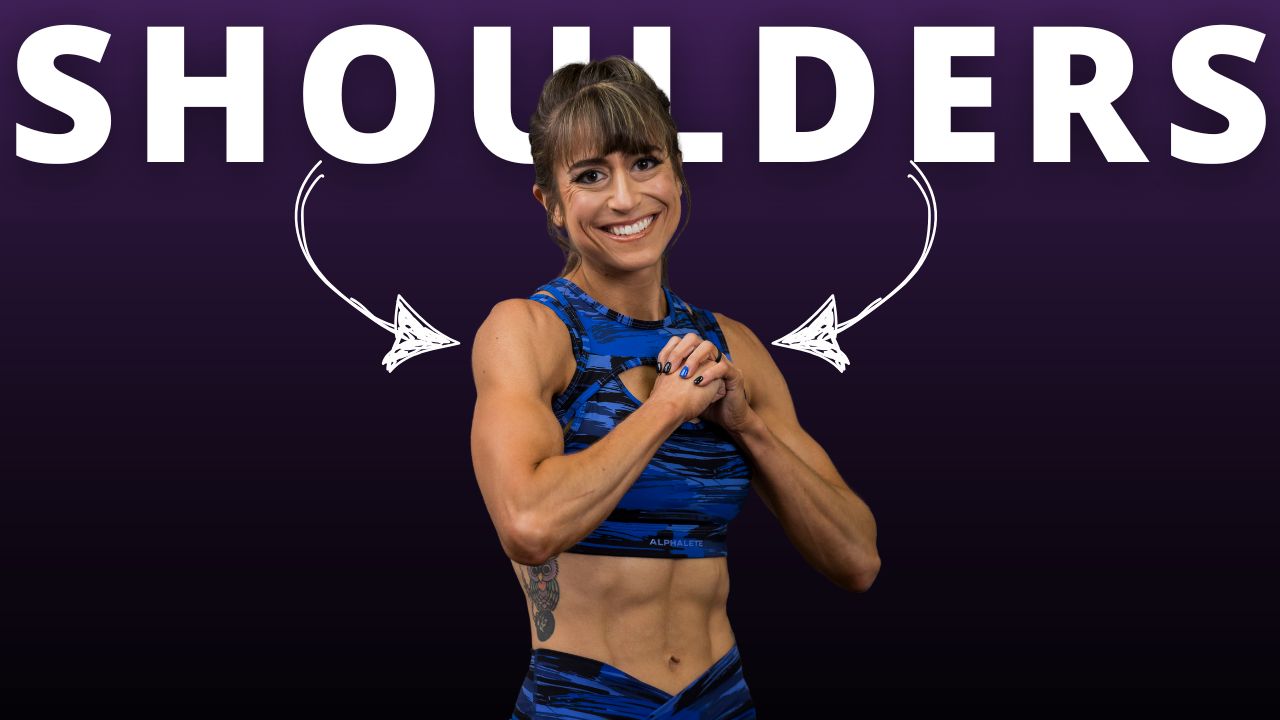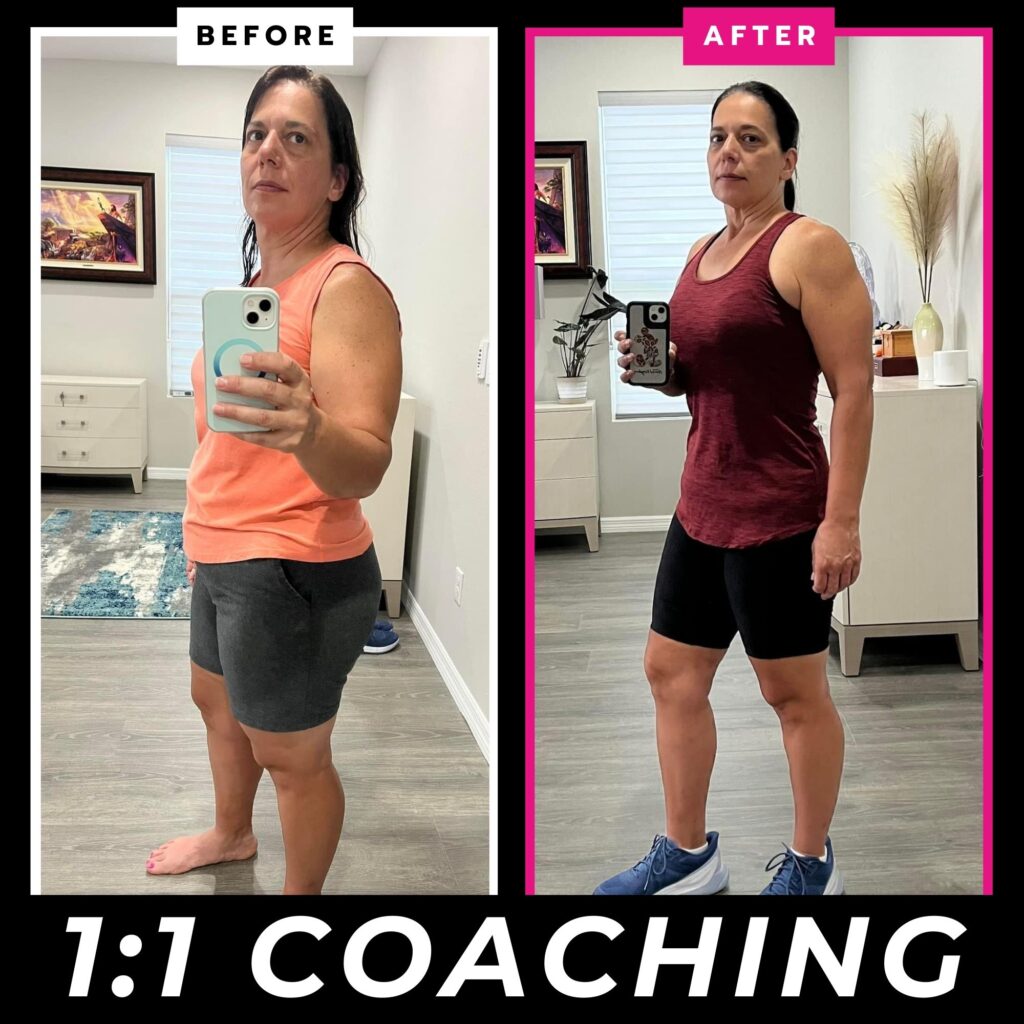Cori (00:00):
Welcome to the Redefining Strength Podcast, everything you need to succeed on your health and fitness journey, even the stuff you don’t want to hear. Let’s talk about being more mindful. When we munch, it can be very easy to eat for a whole host of reasons and not be conscious of the calories we’re consuming and the impact they’re having and what this is really doing to our body. So I’m super excited to be joined by amazing registered dietician, Julia, to talk about being more mindful when we munch. Julia, welcome. I’d love to hear your thoughts on mindful munching.
Julia (00:38):
Thank you. I’m happy to be here. As we know, eating mindfully really helps us bring that intention to the food that we’re choosing and eating, like you said. So the ultimate goal with mindful munching is really to cultivate a healthy relationship with food, to improve our digestion and really learn how to eat in a balanced way that allows us to hit our goals.
Cori (01:00):
So as you know, and I know you are too, we’re big advocates of macro tracking, and I don’t see being more mindful as the opposite of macro tracking. And I do want to get into intuitive eating and how that plays a role and what that really is, but how can being more mindful go with macro tracking to help you really reach your goals?
Julia (01:23):
Yeah, definitely. So the first thing is it really allows us to be intentional, like you were saying. So when we don’t take the time to think about why we’re eating, we can allow those temporary emotions to take over, whether this be stress, boredom, social pressures, or even just aimlessly eating whatever is in front of us because we’re hungry in the moment. So that tracking really helps us bring that intentionality back to the choices that we are making. And then the next issue that we kind of find is that a lot of times when we’re rushed, food can enter our stomach before it’s even ready. So with tracking and being intentional, we’re able to really also kind of dial in on that digestion process where we’re able to better break down our food, chew it properly, improve our digestion, and give our natural satiety signals a chance to really kick in, which also prevents overeating. So through that mindfulness, we’re able to stimulate the activation of the parasympathetic nervous system, often referred to as that rest and digest. So not only is this going to help boost our gut health or digestion, but it’s also really key for those of us looking for weight loss and body recomposition through macro tracking as well.
Cori (02:32):
It’s such an interesting thing because we think what feels natural or our hunger cues are just, well, they’re there, right? It’s our body telling us something, but we don’t realize how much of what’s natural, what our body is. Singly is something that we’ve trained even through previous dieting practices, and so that can make it hard to eat intuitively when we have a specific goal. Can you go over what intuitive eating really is and how being mindful is slightly different from it and how all this works together?
Julia (03:04):
Yeah, so intuitive eating is a way that you’re eating to honor your cravings, your hunger and fullness cues. But the goal being to foster a healthier relationship with food in theory, it is a wonderful concept that we as humans should be able to have the ability to choose what our bodies are needing day-to-day. However, like you brought up, for those of us who have a history of undereating emotional eating or eating a poor quality diet, because our food system is saturated with highly palatable addictive foods, our intuition is probably not going to be the most accurate reflection of what our body actually needs because our current cravings are heavily influenced by how we currently eat, like you said. So you look at someone who has a history of extreme dieting, they probably don’t have the proper hunger cues telling them when they need to eat because their metabolism is downregulated and adapted to that low intake.
(04:00):
You look at someone who craves sugar constantly throughout the day, that could be the result of dysregulated blood sugar from undereating on certain foods like protein, fat, and fiber. And I also just really quickly want to highlight a study that was done, I believe in 2023. It was pretty recent, and it actually showed that as humans, if our protein needs are unmet, we’ll continue to overeat predominantly on carbohydrate and fat rich foods leading to weight gain in an efforts to meet that goal and get that satiety. So while intuitive eating is a great long-term goal for most of us, it’s often not the first step that we need to take to get there.
Cori (04:39):
It’s all about learning what portions we need. And I bring this up too because I think a lot of times we’ll start tracking macros and we’ll get frustrated that we’re not hitting the ratios, but it comes back to, well, if you were hitting the numbers you needed, you’d be at the goal you wanted to be at, but you’re not. So you have to relearn to look at those portions. And in this process of relearning those portions and even tracking things to start, you are learning to eat more mindfully. You’re learning to eat more intuitively because you are seeing what you’re actually consuming and then the impact that it’s truly having. And I think that’s something we don’t talk about enough, the benefit that tracking can truly have to make us more mindful.
Julia (05:23):
Yeah, I definitely agree. I mean, tracking serves as that data to show us what is and what isn’t working for our bodies. So it allows us to go in and separate our actual reality from our own perception of our reality, which is really key because sometimes we can feel like we’re doing great, we can feel like we’re eating the right portions, like you said, we can feel like we may be eating a lot of protein, but it may not always be the case. So tracking is kind of that gateway that allows us to better understand what our bodies need in order to thrive. And over time, as we’re able to shift our palate and really reap the long-term benefits of supporting our metabolism, we’ll find that we’ll be in a much better place to implement these intuitive eating practices. But we need to first put that work in, do that tracking, get that data in order to better educate ourselves and really rewire our metabolisms.
Cori (06:14):
You use the word feel a lot in that, and I think it’s very important that we come back to this word because feelings are not data yet with being more mindful. We have to try and trust in our feelings more, but we have to build more accurate feelings, we’ll say, or mindsets through tracking. But if we’re just allowing how we feel to dictate what we do, think about a fun event. When you’re celebrating excited and it’s fun and the food tastes good, you’re going to be willing to or want to eat more. When you’re stressed after a long day and you’re looking for that comfort and a food gives you comfort, you’re going to go to that food. I know simply when I want more of an ice cream or the peanut butter or whatever else it is, I feel like a portion should be bigger than it is and the portion becomes bigger than it is. Feelings aren’t data, but they can really impact how we ultimately fuel. How can we start to separate out what is a feeling and driving us towards not the correct portions and what’s truly data-driven decisions?
Julia (07:20):
The first step is really just understanding and bringing awareness to it, like you said, right? So a lot of people think that we do these compulsive behaviors like emotional eating because we just lack the willpower on food. Like, oh, I just don’t have the self-control. When in reality we often do it because it’s the only way that we know to either self-soothe or to give ourselves that boost of happiness or whatever. It’s that we’re really seeking from that food. So most of us have heard as dopamine as it’s an important part of our brain’s reward pathway and it causes us to feel good, right? It’s a very pleasurable thing to have. So we also know that foods can give us this dopamine boost really highly palatable foods. So sugary foods, high fat foods. So what makes sense from a scientific standpoint that we are going to reach for these foods, whether it be that ice cream or that glass of wine to make us feel better in these moments because scientifically it’s boosting that dopamine and making us feel better.
(08:19):
But the key takeaway here, and the big point of bringing that awareness to it is that we have to understand that it’s often not the food we’re seeking, it’s the feeling that the food gives us. So the issue is that we’re not really solving the problem at the root. We’re just coping in an unhealthy manner that can contribute to waking and health issues over time. And when this happens continuously, we’re wiring our brain to immediately turn to food when we feel stressed, scared, or even happy. So this is where I always call it the power of the pause that can come in and just allow ourselves to ask those appropriate questions. Am I actually hungry? Am I hoping to relieve feelings of stress, of sadness? Is this food going to satiate me? Am I just eating because I’m at a party and every single person around me is eating?
(09:04):
But ultimately bringing that awareness to it, taking that pause can help us recognize that it’s not really the food that we need, and over time we can begin to replace it with healthier habits. And this is why again, tracking things before eating them can be so helpful because it forces you to take that pause. Not only does it help you be more proactive with our goals as we know, but it really allows you to take a step back outside of the situation, detach from those emotions, and really just pause and think about how we are going to eat and how that lines up with our goals.
Cori (09:39):
It’s that reflection that’s so powerful to give us choice in what we do. And this isn’t to demonize any foods because you are going to want to just enjoy a food that you love, that you grew up with that has memories attached. You’re going to potentially want to sit down to a Thanksgiving meal or have those Christmas cookies, and there’s nothing wrong with these things. I know I am not giving up my summer margaritas and chips and guacamole, especially when the reed avocados are ripe, and it’s not a bad thing to have feelings associated with food, but it’s being mindful then of the choices you’re making when you do consume these things and the impact they’re having on your results. Because when we’re mindful in that way, we don’t create guilt too, which only creates more of a spiral with some of these things. However, pausing is easier said than done. And I love that you bring up tracking beforehand because that allows you to assess what you really need. But let’s just say something comes up and you do eat out of emotion. How can you then use the power of the pause to learn from that?
Julia (10:39):
Yeah, that’s a great question. And that’s where again, we always say tracking services that data to have. So even I have all my clients track your off days, track those moments that aren’t so perfect because that’s data that allows us to then peel back those layers, go back and see what could have led to this, what could have caused this. But again, kind of just that power of the pause in the moment, even if you’re out at a restaurant with people socially, it allows you to come back to things and check in with yourself and check in with what you actually need and want in that moment. And like you said, sometimes you are going to want to go for the cheesecake or the ice cream or whatever it is, and you are going to want to enjoy it. And I think that’s totally okay to even allow yourself to acknowledge like, yes, I want to go for this.
(11:21):
And even if you’re going to try to work it in with your goals, whatever that looks like. But again, just making sure that we’re taking that pause and if it’s going to be something that we’re going to go for, we’re going to enjoy it, savor it, enjoy the experience with the people that we’re around versus feeling that guilt around it. And if it is something that we’re like, I’m not really going to enjoy this. I’m extremely stressed right now, I’m uncomfortable. This is not what’s going to serve me in this moment, then that’s okay too. And that’s again where the power of the pause allows you to det from.
Cori (11:53):
It’s realizing that being more mindful of what you’re consuming is also understanding why you’re consuming it. And on the flip side, while I’m actually guilty of both, while overeating with stress, sometimes we can even undereat with stress and we’re not mindful that we’re eating too little and that’s impacting our results. How do you navigate if you are undereating due to stress? Because we talk a lot about overeating with it, but undereating can also be an issue.
Julia (12:20):
Yeah, definitely. And it’s kind of that idea of that fight or flight response which you can get, which causes us to overeat can also cause us to undereat like you’re saying. And sometimes people feel like they can’t really switch gears from experiencing that stress that they are experiencing firsthand. So even just again, practicing mindfulness by meeting ourselves where we’re at, remembering that food is still fuel, and this could mean even just adjusting your plan for the time being. Maybe you’re going to rely more on things like small calorie dense snacks, things like protein bars and shakes, things like yogurt bowls where you can add a lot of nuts and seeds and kind of bulk that up a little bit. Things like smoothies where you can add in yogurt, nut butters, or even using an eating schedule and setting reminders for yourself throughout the day, that can be huge. As silly as it sounds, just setting an alarm on your phone or scheduling it in your calendar when to eat, that can be huge just to remind you, Hey, I know I may not want to eat right now, but it’s important to fuel my body and still give myself as care in this moment. And just having that little reminder can go a really long way to helping you to still accomplish that goal and get in that fuel when you’re feeling a little bit stressed.
Cori (13:31):
It’s that accountability and outside perspective that we’re often missing because again, feelings aren’t data and what’s going on inside our head can often take us down a path that’s not correct if we let it. And so being more mindful is assessing where those feelings are coming from. With that being said, we can track ahead to help hold us accountable, whether we overeat or we even undereat, and especially if we’re undereating, we might think, well, this is even good for my weight loss goals, which is a whole other subject, but not necessarily the case, which is why meal planning can be so key so that you can track ahead, you can hold yourself accountable, you can give yourself that outside perspective. Can you go over some tips to help with that? I think that is often the biggest struggle that pre-planning, but if we don’t do it, we’re setting ourselves up for failure. And as odd as it sounds to have a plan in place that makes us more mindful.
Julia (14:25):
Yeah, definitely. I mean, even just pre-planning or pre logging, whatever that looks like for you can really help us bring that intentionality and just ensure that we are hitting our goals and we’re usually sitting down to plan in a time that we’re not hungry or tired, so we’re able to make more mindful choices. So we’re really just setting ourselves up for success. Like you said, sometimes you aren’t able to be mindful simply just because our environment doesn’t allow for us make long choices. If you’re someone who you work 10 to 12 hour shifts and you don’t have a plan for what you’re going to eat when you get off shift, then of course you’re not going to make the best choices. You can’t expect yourself to do that. But pre tracking really helps to come in and reduce any questions of what you should have, reduce any food noise throughout the day and just allow you to set up a plan.
(15:11):
And this can look different for every single person. For some people it can be meal prepping individual meals. For some people it could be bulk prepping, maybe a few protein items or veggies, if that’s what you struggle with, so that you have them easily available to throw into meals, even if it’s coming home and chopping up your produce, your fruits and veggies and just having them ready to grab in the fridge to pair with something for when you get off that shift, that can go a huge way or a long way just to help you have that readily available for you and give you that crutch to lean on when you are needing it.
Cori (15:45):
You’re using that power of the pause to plan ahead so that you can be more mindful because you’re not letting emotions or stress or fatigue or any of these other things come into play. You’re sitting down to really assess. And I think it’s key at these points that we reflect on even what our emotional triggers are and how we respond to them and why they come up, and even what our coming week or coming months, even the coming year looks like in terms of some of those stressors to really plan ahead for it. Because if we don’t own what’s going on, all those priorities that come up are what become our excuses. So off of that key takeaways, if someone wants to be more mindful so that their priorities aren’t sabotaging them, their emotions aren’t sabotaging them, they can be more mindful in their eating to see the best results.
Julia (16:33):
I mean, just going off of that, obviously dialing into what your personal causes are that lead you to eat more mindlessly. So could it be that lack of preparation? Could it be emotions? Could it be that you’re on the go and you’re very busy? It could it be lack of time? It could it be just distractions during mealtime that you’re experiencing, but whatever it is, really dialing in and figuring out what those biggest challenges are for yourself will allow you to then come up with a plan to implement the necessary changes. So for those who stress eat, for example, this could mean leaning into that power of the paws and working to find healthier stress releases unrelated to food or even facing the stress at the root for those who are busy and on the move. This could mean planning a few meals out, maybe going for overnight oats or a smoothie that you can take with you on the go in your car, or even keeping some macro friendly, convenient snacks on hand like beef jerky, roos, edamame, protein bars in your gym bag for whenever you’re in a pinch. But again, this is where tracking will service that data and allows us to see those areas throughout the day in the weeks where we are struggling and allow us to see those huge room and areas of growth.
Cori (17:45):
Being more mindful isn’t just being aware of how your body responds to the food that you eat or how full you feel. It really is about having that outside perspective of how everything works together and how your fueling is impacting you and how your emotions are impacting your fueling. So it’s so much more than just intuitive eating, truly at its heart. And again, we are human and that voice inside our head can really sometimes sabotage us. So having that outside perspective and using tracking to our advantage, whether it is in a food tracker and if someone’s maybe struggling with the food tracker, struggling with macros, struggling with even becoming a little feeling that they’re obsessive with the numbers, what would you recommend they do to track to help them have that outside perspective to be more mindful?
Julia (18:31):
Yeah, that’s a great question. I would say even just taking a more modified approach to tracking, whether it be just a protein goal or again, if you’re really struggling with a certain meal, even just focusing on that meal, maybe it’s just breakfast or it’s just your snacks and really just trying to start small, and then over time you can build up and gather more data. But even just that will allow you to then go in and see how you can make just those little 1% changes day to day.
Cori (18:58):
I love that. And I even think taking pictures of the meals you want to eat, you plan to eat that will fuel you well. And then even taking pictures of the things that you maybe consumed that weren’t on what you had planned to eat, to sort of be able to compare, to have that data, to understand even writing out some notes on why you then had those things. There’s so many different ways to hold yourself accountable and give that outside perspective to then assess your feelings, how they’re impacting your fueling, and be more mindful in how you choose to fuel. Julia, any other closing thoughts? This has been fabulous.
Julia (19:32):
Just again, kind of figuring out what those possible causes are for you, and this is where it looks different for every single person and not being afraid to even dive in if it is something more so like stress, if it is something, whatever it may be for you, just not being afraid to dive even into it, because often it’s things beyond food, right? It’s that planning, it’s that accountability. So just not being afraid to dive into it and make those small changes over time, that is what adds up to that lasting change.
Cori (20:01):
It’s all in the reflection guys. Hopefully this was really helpful for you to really step back, see how you can be more mindful in your fueling. Love to hear your biggest takeaways. Julia, thank you so much for joining me today. Have a great rest of your week.
*Note: This transcript is autogenerated there may be some unintended errors.











